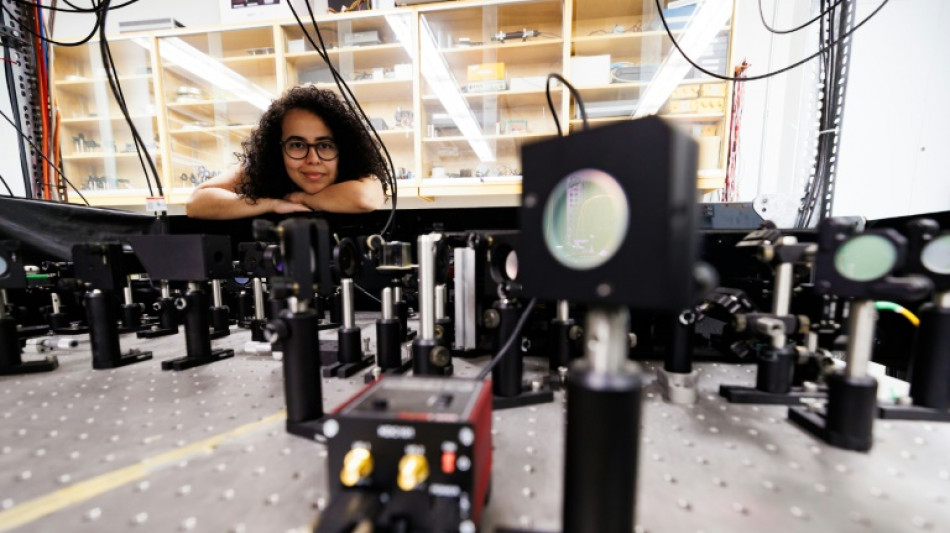
-
 Exec linked to Bangkok building collapse arrested
Exec linked to Bangkok building collapse arrested
-
Zelensky says Russian attacks ongoing despite Putin's Easter truce

-
 Vaibhav Suryavanshi: the 14-year-old whose IPL dream came true
Vaibhav Suryavanshi: the 14-year-old whose IPL dream came true
-
Six drowning deaths as huge waves hit Australian coast

-
 Ukrainian soldiers' lovers kept waiting as war drags on
Ukrainian soldiers' lovers kept waiting as war drags on
-
T'Wolves dominate Lakers, Nuggets edge Clippers as NBA playoffs start

-
 Taxes on super rich and tech giants stall under Trump
Taxes on super rich and tech giants stall under Trump
-
Star Wars series 'Andor' back for final season

-
 Neighbours improvise first aid for wounded in besieged Sudan city
Neighbours improvise first aid for wounded in besieged Sudan city
-
Tariffs could lift Boeing and Airbus plane prices even higher

-
 Analysts warn US could be handing chip market to China
Analysts warn US could be handing chip market to China
-
Unbeaten Miami edge Columbus in front of big MLS crowd in Cleveland

-
 Social media helps fuel growing 'sex tourism' in Japan
Social media helps fuel growing 'sex tourism' in Japan
-
'Pandora's box': alarm bells in Indonesia over rising military role

-
 Alaalatoa hails 'hustling hard' Brumbies for rare Super Rugby clean sheet
Alaalatoa hails 'hustling hard' Brumbies for rare Super Rugby clean sheet
-
Trio share lead at tight LA Championship

-
 Sampdoria fighting relegation disaster as old heroes ride into town
Sampdoria fighting relegation disaster as old heroes ride into town
-
Recovering pope expected to delight crowds at Easter Sunday mass

-
 Nuggets edge Clippers in NBA playoff overtime thriller, Knicks and Pacers win
Nuggets edge Clippers in NBA playoff overtime thriller, Knicks and Pacers win
-
Force skipper clueless about extra-time rules in pulsating Super Rugby draw

-
 Nuggets edge Clippers in NBA playoff overtime thriller, Pacers thump Bucks
Nuggets edge Clippers in NBA playoff overtime thriller, Pacers thump Bucks
-
Unbeaten Miami edge Columbus in front of big crowd in Cleveland

-
 Kim takes one-shot lead over Thomas, Novak at RBC Heritage
Kim takes one-shot lead over Thomas, Novak at RBC Heritage
-
Another round of anti-Trump protests hits US cities

-
 'So grateful' - Dodgers star Ohtani and wife welcome first child
'So grateful' - Dodgers star Ohtani and wife welcome first child
-
PSG maintain unbeaten Ligue 1 record, Marseille back up to second

-
 US, Iran report progress in nuclear talks, will meet again
US, Iran report progress in nuclear talks, will meet again
-
US Supreme Court intervenes to block Trump deportations

-
 Hamas armed wing says fate of US-Israeli captive unknown
Hamas armed wing says fate of US-Israeli captive unknown
-
Pacers thump Bucks to open NBA playoffs

-
 Sabalenka reaches Stuttgart semis as Ostapenko extends Swiatek mastery
Sabalenka reaches Stuttgart semis as Ostapenko extends Swiatek mastery
-
Zelensky says Ukraine will observe Putin's Easter truce but claims violations

-
 'Fuming' Watkins fires Villa in bid to prove Emery wrong
'Fuming' Watkins fires Villa in bid to prove Emery wrong
-
DR Congo boat fire toll revised down to 33

-
 England thrash Scotland to set up France Grand Slam showdown
England thrash Scotland to set up France Grand Slam showdown
-
Verstappen's Red Bull 'comes alive' to claim record pole in Jeddah

-
 McTominay fires Napoli level with Inter as Conte fuels exit rumours
McTominay fires Napoli level with Inter as Conte fuels exit rumours
-
Rajasthan unleash Suryavanshi, 14, as youngest IPL player but lose thriller

-
 Man City boost top five bid, Aston Villa thrash in-form Newcastle
Man City boost top five bid, Aston Villa thrash in-form Newcastle
-
Villa rout Newcastle to rekindle bid to reach Champions League

-
 Dumornay gives Lyon lead over Arsenal in Women's Champions League semis
Dumornay gives Lyon lead over Arsenal in Women's Champions League semis
-
Trans rights supporters rally in London, Edinburgh after landmark ruling

-
 'We have to wait': Barca's Flick on Lewandowski injury fear
'We have to wait': Barca's Flick on Lewandowski injury fear
-
Bordeaux-Begles backups edge Pau to close in on Top 14 summit

-
 Trans rights supporters rally outside in London, Edinburgh after landmark ruling
Trans rights supporters rally outside in London, Edinburgh after landmark ruling
-
PSG beat Le Havre to stay on course for unbeaten Ligue 1 season

-
 Man City close in on Champions League with Everton late show
Man City close in on Champions League with Everton late show
-
14-year-old Vaibhav Suryavanshi becomes youngest IPL player

-
 Barca make stunning comeback to beat Celta Vigo in Liga thriller
Barca make stunning comeback to beat Celta Vigo in Liga thriller
-
Zverev sets up birthday bash with Shelton in Munich


Scientists observe 'negative time' in quantum experiments
Scientists have long known that light can sometimes appear to exit a material before entering it -- an effect dismissed as an illusion caused by how waves are distorted by matter.
Now, researchers at the University of Toronto, through innovative quantum experiments, say they have demonstrated that "negative time" isn't just a theoretical idea -- it exists in a tangible, physical sense, deserving closer scrutiny.
The findings, yet to be published in a peer-reviewed journal, have attracted both global attention and skepticism.
The researchers emphasize that these perplexing results highlight a peculiar quirk of quantum mechanics rather than a radical shift in our understanding of time.
"This is tough stuff, even for us to talk about with other physicists. We get misunderstood all the time," said Aephraim Steinberg, a University of Toronto professor specializing in experimental quantum physics.
While the term "negative time" might sound like a concept lifted from science fiction, Steinberg defends its use, hoping it will spark deeper discussions about the mysteries of quantum physics.
- Laser experiments -
Years ago, the team began exploring interactions between light and matter.
When light particles, or photons, pass through atoms, some are absorbed by the atoms and later re-emitted. This interaction changes the atoms, temporarily putting them in a higher-energy or "excited" state before they return to normal.
In research led by Daniela Angulo, the team set out to measure how long these atoms stayed in their excited state. "That time turned out to be negative," Steinberg explained -- meaning a duration less than zero.
To visualize this concept, imagine cars entering a tunnel: before the experiment, physicists recognized that while the average entry time for a thousand cars might be, for example, noon, the first cars could exit a little sooner, say 11:59 am. This result was previously dismissed as meaningless.
What Angulo and colleagues demonstrated was akin to measuring carbon monoxide levels in the tunnel after the first few cars emerged and finding that the readings had a minus sign in front of them.
- Relativity intact -
The experiments, conducted in a cluttered basement laboratory bristling with wires and aluminum-wrapped devices, took over two years to optimize. The lasers used had to be carefully calibrated to avoid distorting the results.
Still, Steinberg and Angulo are quick to clarify: no one is claiming time travel is a possibility. "We don't want to say anything traveled backward in time," Steinberg said. "That's a misinterpretation."
The explanation lies in quantum mechanics, where particles like photons behave in fuzzy, probabilistic ways rather than following strict rules.
Instead of adhering to a fixed timeline for absorption and re-emission, these interactions occur across a spectrum of possible durations -- some of which defy everyday intuition.
Critically, the researchers say, this doesn't violate Einstein's theory of special relativity, which dictates that nothing can travel faster than light. These photons carried no information, sidestepping any cosmic speed limits.
- A divisive discovery -
The concept of "negative time" has drawn both fascination and skepticism, particularly from prominent voices in the scientific community.
German theoretical physicist Sabine Hossenfelder, for one, criticized the work in a YouTube video viewed by over 250,000 people, noting, "The negative time in this experiment has nothing to do with the passage of time -- it's just a way to describe how photons travel through a medium and how their phases shift."
Angulo and Steinberg pushed back, arguing that their research addresses crucial gaps in understanding why light doesn’t always travel at a constant speed.
Steinberg acknowledged the controversy surrounding their paper's provocative headline but pointed out that no serious scientist has challenged the experimental results.
"We've made our choice about what we think is a fruitful way to describe the results," he said, adding that while practical applications remain elusive, the findings open new avenues for exploring quantum phenomena.
"I'll be honest, I don’t currently have a path from what we've been looking at toward applications," he admitted. "We're going to keep thinking about it, but I don't want to get people's hopes up."
L.Meier--VB




